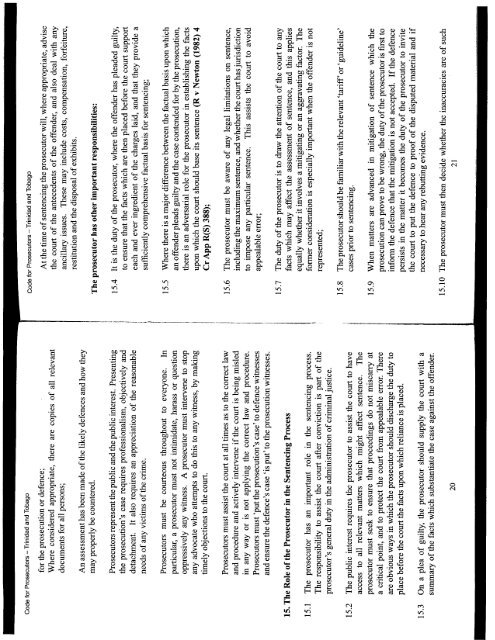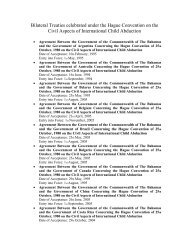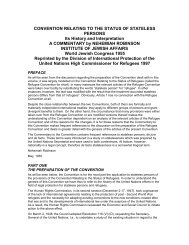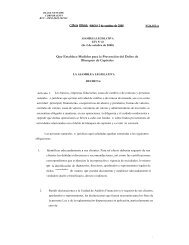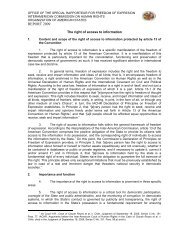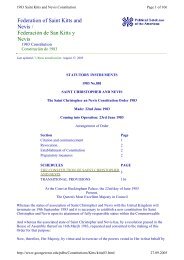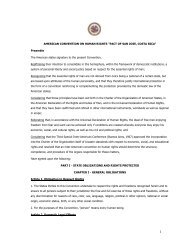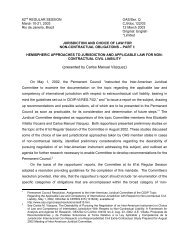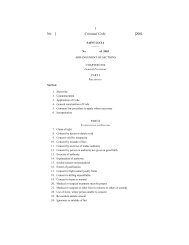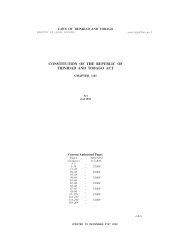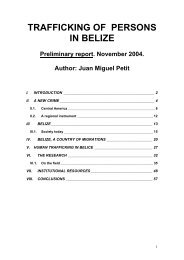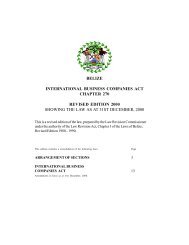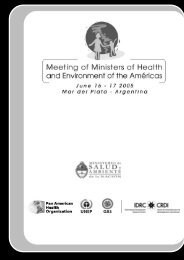Code for Prosecutors - OAS
Code for Prosecutors - OAS
Code for Prosecutors - OAS
Create successful ePaper yourself
Turn your PDF publications into a flip-book with our unique Google optimized e-Paper software.
<strong>Code</strong> <strong>for</strong> <strong>Prosecutors</strong> - Trinidad and Tobago<br />
<strong>for</strong> the prosecution or defence;<br />
Where considered appropriate, there are copies of all relevant<br />
documents <strong>for</strong> all persons;<br />
An assessment has been made of the likely defences and how they<br />
may properly be countered.<br />
<strong>Prosecutors</strong> represent the public and the public interest. Presenting<br />
the prosecution's case requires professionalism, objectively and<br />
detachment. It also requires an appreciation of the reasonable<br />
needs of any victims of the crime.<br />
<strong>Prosecutors</strong> must be courteous throughout to everyone. In<br />
particular, a prosecutor must not intimidate, harass or question<br />
oppressively any witness. A prosecutor must intervene to stop<br />
any advocate who attempts to do this to any witness, by making<br />
timely objections to the court.<br />
<strong>Prosecutors</strong> must assist the court at all times as to the correct law<br />
and procedure and actively intervene if the court is being misled<br />
in any way or is not applying the correct law and procedure.<br />
<strong>Prosecutors</strong> must 'put the prosecution's case' to defence witnesses<br />
and ensure the defence's case 'is put' to the prosecution witnesses.<br />
15. The Role of the Prosecutor in the Sentencing Process<br />
15.1 The prosecutor has an important role in the sentencing process.<br />
The responsibility to assist the court after conviction is part of the<br />
prosecutor's general duty in the administration of criminal justice.<br />
15.2 The public interest requires the prosecutor to assist the court to have<br />
access to all relevant matters which might affect sentence. The<br />
prosecutor must seek to ensure that proceedings do not miscarry at<br />
a critical point, and to protect the court from appealable error. There<br />
are obvious ways in which the prosecutor should discharge the duty to<br />
place be<strong>for</strong>e the court the facts upon which reliance is placed.<br />
15.3 On a plea of guilty, the prosecutor should supply the court with a<br />
summary of the facts which substantiate the case against the offender.<br />
20<br />
<strong>Code</strong> <strong>for</strong> <strong>Prosecutors</strong> - Trinidad and Tobago<br />
At the time of sentencing the prosecutor will, where appropriate, advise<br />
the court of the antecedents of the offender, and also deal with any<br />
ancillary issues. These may include costs, compensation, <strong>for</strong>feiture,<br />
restitution and the disposal of exhibits.<br />
The prosecutor has other important responsibilities:<br />
15.4 It is the duty of the prosecutor, where the offender has pleaded guilty,<br />
to ensure that the facts which are then placed be<strong>for</strong>e the court support<br />
each and ever ingredient of the charges laid, and that they provide a<br />
sufficiently comprehensive factual basis <strong>for</strong> sentencing;<br />
15.5 Where there is a major difference between the factual basis upon which<br />
an offender pleads guilty and the case contended <strong>for</strong> by the prosecution,<br />
there is an adversarial role <strong>for</strong> the prosecutor in establishing the facts<br />
upon which the court should base its sentence (R v Newton (1982) 4<br />
CrAppR(S)388);<br />
15.6 The prosecutor must be aware of any legal limitations on sentence,<br />
including the maximum sentence, and whether the court has jurisdiction<br />
to impose any particular sentence. This assists the court to avoid<br />
appealable error;<br />
15.7 The duty of the prosecutor is to draw the attention of the court to any<br />
facts which may affect the assessment of sentence, and this applies<br />
equally whether it involves a mitigating or an aggravating factor. The<br />
<strong>for</strong>mer consideration is especially important when the offender is not<br />
represented;<br />
15.8 The prosecutor should be familiar with the relevant 'tariff' or 'guideline'<br />
cases prior to sentencing.<br />
15.9 When matters are advanced in mitigation of sentence which the<br />
prosecution can prove to be wrong, the duty of the prosecutor is first to<br />
in<strong>for</strong>m the defence that the mitigation is not accepted. If the defence<br />
persists in the matter it becomes the duty of the prosecutor to invite<br />
the court to put the defence to proof of the disputed material and if<br />
necessary to hear any rebutting evidence.<br />
15.10 The prosecutor must then decide whether the inaccuracies are of such<br />
21


